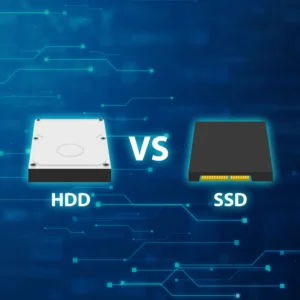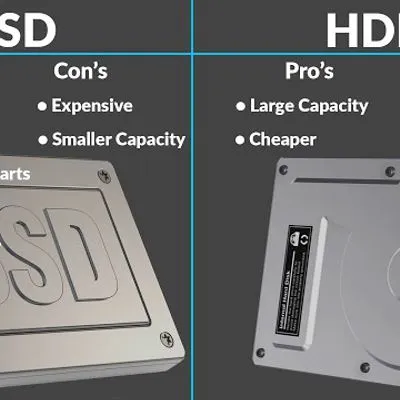SSD vs. HDD Comparison

Noise and Vibration: SSD vs. HDD, SSDs Operate Silently, Unlike Noisy HDDs
SSD vs. HDD: 5 Key Reasons Why SSD is the Better Choice
In the realm of data storage, the debate between SSD vs. HDD (solid-state drives (SSDs) and hard disk drives (HDDs)) has been ongoing for years. While HDDs have traditionally been the more affordable option, SSDs have emerged as the superior choice for a multitude of reasons. One such reason is their exceptional performance in terms of noise and vibration.
Unlike HDDs, which rely on spinning disks to read and write data, SSDs utilize flash memory chips. This fundamental difference in technology translates into a significant advantage for SSDs when it comes to noise and vibration. HDDs generate noticeable noise due to the constant spinning of their disks, which can be distracting and even disruptive in quiet environments. SSDs, on the other hand, operate silently, as they do not have any moving parts. This makes them an ideal choice for noise-sensitive applications, such as home offices, libraries, and recording studios.
Furthermore in the comparison of SSD vs. HDD, the lack of moving parts in SSDs also eliminates vibration. HDDs can cause vibrations that can be transmitted to the computer case and other components, potentially leading to premature wear and tear. SSDs, however, do not produce any vibrations, ensuring a stable and reliable operating environment for your computer.
In comparing the SSD vs. HDD, The absence of noise and vibration in SSDs not only enhances the user experience but also contributes to the longevity of the drive. HDDs are more susceptible to damage from excessive noise and vibration, which can shorten their lifespan. SSDs, on the other hand, are more durable and can withstand higher levels of shock and vibration, making them a more reliable storage solution.
In addition to the comparison of SSD vs. HDD; their superior performance in terms of noise and vibration, SSDs also offer a range of other advantages over HDDs, including faster boot times, quicker application loading, and improved overall system responsiveness. These benefits make SSDs the ideal choice for users who demand the best possible performance from their computers.
In conclusion, SSDs are the clear choice for users who prioritize a quiet and vibration-free computing experience. Their silent operation and exceptional durability make them the superior storage solution for a wide range of applications. While HDDs may still be a viable option for budget-conscious users, SSDs offer a compelling combination of performance, reliability, and user comfort that make them the better choice for most users.
Energy Efficiency: SSD vs. HDD, SSDs Consume Less Power Than HDDs
SSD vs. HDD: 5 Key Reasons Why SSD is the Better Choice
In the realm of data storage, the debate between solid-state drives (SSDs) and hard disk drives (HDDs) has been ongoing for years. While HDDs have traditionally been the more affordable option, SSDs have emerged as the superior choice for a multitude of reasons. One of the most significant advantages of SSDs lies in their energy efficiency.
SSDs consume significantly less power than HDDs due to their lack of moving parts. HDDs rely on spinning disks to read and write data, which requires a substantial amount of energy. In contrast, SSDs use flash memory chips that store data electronically, eliminating the need for mechanical components. This difference in design translates into lower power consumption, making SSDs ideal for laptops and other portable devices where battery life is crucial.
Moreover, SSDs are more efficient in terms of data access. HDDs must physically seek and retrieve data from specific locations on the disk, which can be a time-consuming process. SSDs, on the other hand, can access data directly from any location on the drive, resulting in faster boot times, application launches, and file transfers. This improved performance not only enhances user experience but also reduces the overall power consumption of the system.
Furthermore, SSDs are more durable than HDDs. HDDs are susceptible to damage from shock and vibration, as the spinning disks can be easily disrupted. SSDs, however, have no moving parts, making them more resistant to physical impacts. This durability is particularly advantageous for devices that are frequently transported or used in harsh environments.
In addition to their energy efficiency, performance, and durability advantages, SSDs also offer improved security. HDDs can be vulnerable to data loss in the event of a power outage or system failure, as the data is stored on magnetic disks that can be corrupted. SSDs, on the other hand, use non-volatile flash memory, which retains data even when the power is off. This makes SSDs a more reliable and secure option for storing sensitive information.
In conclusion, SSDs offer a clear advantage over HDDs in terms of energy efficiency, performance, durability, and security. While HDDs may still be a viable option for budget-conscious users, SSDs are the superior choice for those who prioritize speed, reliability, and energy savings. As technology continues to advance, SSDs are expected to become even more affordable and accessible, making them the preferred storage solution for a wide range of applications.
Capacity and Cost: SSD vs. HDD, SSDs Offer Higher Capacity at a Lower Cost
SSD vs. HDD: 5 Key Reasons Why SSD is the Better Choice
In the realm of data storage, the debate between solid-state drives (SSDs) and hard disk drives (HDDs) has been ongoing for years. While HDDs have traditionally been the more affordable option, SSDs have emerged as the superior choice for a multitude of reasons. Here are five key factors that highlight the advantages of SSDs over HDDs:
1. Speed and Performance:
SSDs utilize flash memory, which allows for significantly faster data access and transfer speeds compared to HDDs. This translates into lightning-fast boot times, application loading, and overall system responsiveness. SSDs can perform read/write operations in milliseconds, while HDDs typically take several seconds.
2. Durability and Reliability:
SSDs have no moving parts, unlike HDDs which rely on spinning disks. This makes SSDs more resistant to physical damage, such as drops or vibrations. Additionally, SSDs have a longer lifespan and are less prone to data loss due to mechanical failures.
3. Capacity and Cost:
Contrary to popular belief, SSDs are now available in higher capacities at a lower cost per gigabyte than HDDs. As technology advances, the production costs of SSDs continue to decline, making them increasingly affordable for consumers.
4. Energy Efficiency:
SSDs consume significantly less power than HDDs, which can lead to substantial energy savings over time. This is particularly beneficial for laptops and other portable devices where battery life is crucial.
5. Noise and Heat Generation:
HDDs generate noticeable noise due to the spinning disks, while SSDs operate silently. Additionally, SSDs produce less heat, which can help extend the lifespan of other components in your system.
In conclusion, SSDs offer a clear advantage over HDDs in terms of speed, durability, capacity, energy efficiency, and noise generation. While HDDs may still be suitable for certain applications where cost is a primary concern, SSDs are the superior choice for most users seeking optimal performance and reliability. As technology continues to evolve, SSDs are expected to become even more affordable and accessible, making them the undisputed choice for data storage in the future.
Durability and Reliability: SSD vs. HDD, SSDs Withstand Wear and Tear Better Than HDDs
SSD vs. HDD: 5 Key Reasons Why SSD is the Superior Choice
In the realm of data storage, the debate between solid-state drives (SSDs) and hard disk drives (HDDs) has been ongoing for years. While HDDs have traditionally been the more affordable option, SSDs have emerged as the superior choice for a multitude of reasons, particularly in terms of durability and reliability.
1. Shock and Vibration Resistance:
SSD vs. HDD; SSDs lack moving parts, unlike HDDs, which rely on spinning disks. This inherent design difference makes SSDs significantly more resistant to shock and vibration. They can withstand accidental drops and bumps without compromising data integrity, making them ideal for laptops and portable devices.
2. Faster Data Access:
SSD vs. HDD, SSDs utilize flash memory, which allows for much faster data access than HDDs. This translates into quicker boot times, application launches, and file transfers. The absence of mechanical components eliminates the seek time associated with HDDs, resulting in near-instantaneous data retrieval.
3. Lower Power Consumption:
SSD vs. HDD, SSDs consume significantly less power than HDDs. This is because they do not require spinning disks or moving parts, which consume a substantial amount of energy. The reduced power consumption extends battery life in laptops and other portable devices.
4. Longer Lifespan:
SSDs have a longer lifespan than HDDs. The absence of moving parts reduces the risk of mechanical failure, which is a common cause of data loss in HDDs. SSDs can typically last for several years, while HDDs may fail within a few years of use.
5. Data Security:
SSDs offer enhanced data security compared to HDDs. They can be encrypted using hardware-based encryption, making it virtually impossible for unauthorized individuals to access sensitive data. Additionally, SSDs can be physically destroyed without compromising data integrity, unlike HDDs, which may still contain recoverable data after physical damage.
In conclusion for SSD vs. HDD comparison, SSDs are the superior choice over HDDs in terms of durability and reliability. Their shock and vibration resistance, faster data access, lower power consumption, longer lifespan, and enhanced data security make them the ideal storage solution for laptops, portable devices, and mission-critical applications where data integrity is paramount.
Speed and Performance: SSD vs. HDD, SSDs Outpace HDDs in Every Way
SSD vs. HDD: 5 Key Reasons Why SSD is the Better Choice
In the realm of data storage, the debate between SSD vs. HDD (solid-state drives (SSDs) and hard disk drives (HDDs)) has been ongoing for years. While HDDs have traditionally been the more affordable option, SSDs have emerged as the superior choice for speed, performance, and reliability. Here are five key reasons why SSDs are the better choice:
1. SSD vs. HDD, Blazing-Fast Read/Write Speeds: SSDs utilize flash memory, which allows for significantly faster read and write speeds compared to HDDs. This translates into lightning-fast boot times, application launches, and file transfers.
2. SSD vs. HDD, Reduced Latency: Latency, the time it takes for a drive to access data, is a crucial factor in overall performance. SSDs have extremely low latency, enabling instant data retrieval and eliminating the frustrating delays associated with HDDs.
3. SSD vs. HDD, Enhanced Durability: Unlike HDDs, which rely on spinning disks, SSDs have no moving parts. This makes them highly resistant to shock, vibration, and accidental drops, ensuring data integrity even in harsh environments.
4. Energy Efficiency: SSDs consume significantly less power than HDDs, making them more environmentally friendly and ideal for laptops and other portable devices.
5. Compact Size and Weight: SSDs are much smaller and lighter than HDDs, making them ideal for space-constrained applications such as ultra-thin laptops and compact desktops.
In addition to these key advantages, SSDs also offer several other benefits, including:
* SSD vs. HDD Silent Operation: SSDs operate silently, eliminating the noise associated with HDDs.
* SSD vs. HDD Increased Reliability: SSDs have a longer lifespan and are less prone to failure than HDDs.
* SSD vs. HDD Data Security: SSDs can be encrypted for enhanced data protection.
While HDDs may still be a viable option for budget-conscious users or those with large storage requirements, SSDs are the clear choice for anyone seeking superior speed, performance, and reliability. Whether you’re a professional, gamer, or simply someone who values efficiency, an SSD is an investment that will significantly enhance your computing experience.
Overview:
When deciding between an SSD vs. HDD for your computer or storage needs, it’s important to understand the key differences that can affect your device’s performance. SSD (Solid State Drive) and HDD (Hard Disk Drive) are both types of storage, but they operate very differently. While HDDs have been around longer and are often more affordable, SSDs are gaining popularity for several reasons. In this article, we’ll explore 5 key reasons why SSD is the better choice when compared to HDD.
First, SSDs offer significantly faster read and write speeds than HDDs. This means your computer will boot up quicker, applications will load faster, and large files will transfer in no time. Additionally, SSDs have no moving parts, making them more durable and less prone to damage from drops or bumps compared to the mechanical parts of an HDD.
Another advantage of SSDs over HDDs is power efficiency. SSDs consume less power, which can extend your laptop’s battery life. With better energy efficiency, an SSD can make a noticeable difference in how long your device lasts between charges.
SSDs also provide a quieter and cooler operation. Since there are no moving parts in an SSD, it runs almost silently, whereas HDDs can generate more noise and heat due to their spinning disks.
Lastly, SSDs are becoming more affordable, with prices dropping over time. While they were once seen as a premium option, SSDs are now accessible for a wider range of users, making them an attractive choice in the SSD vs. HDD debate.
Conclusion: SSD vs. HDD – Why SSD is the Better Choice
In the battle of SSD vs. HDD, it’s clear that SSD is the better choice for most users. The speed, durability, power efficiency, and quieter operation make SSDs stand out as a superior option. If you value performance and longevity, SSD is the way to go. While HDDs may still have their place for large storage needs at a lower cost, the benefits of an SSD far outweigh the drawbacks. Choosing an SSD over an HDD will provide a faster, more reliable, and enjoyable computing experience overall.




GIPHY App Key not set. Please check settings